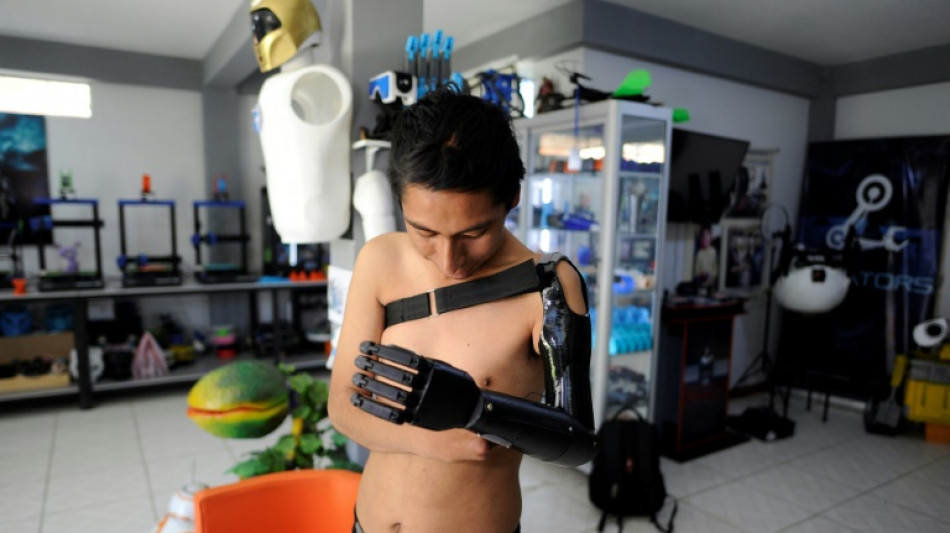
-
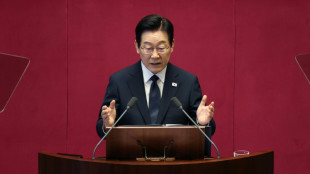 North Korea says Seoul-US sub deal will trigger 'nuclear domino' effect
North Korea says Seoul-US sub deal will trigger 'nuclear domino' effect
-
Education for girls hit hard by India's drying wells
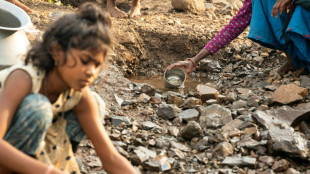
-
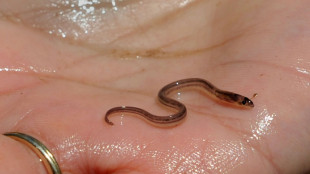 Haitian gangs getting rich off murky market for baby eels
Haitian gangs getting rich off murky market for baby eels
-
Trump says will talk to Venezuela's Maduro, 'OK' with US strikes on Mexico

-
 Oscar Piastri wins Australia's top sports honour
Oscar Piastri wins Australia's top sports honour
-
'Severely restricted': Russia's Saint Petersburg faces cultural crackdown
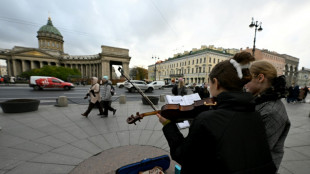
-
 Polish PM denounces 'sabotage' of railway supply line to Ukraine
Polish PM denounces 'sabotage' of railway supply line to Ukraine
-
UK toughens asylum system with radical overhaul

-
 Carney's Liberals pass budget, avoiding snap Canada election
Carney's Liberals pass budget, avoiding snap Canada election
-
LeBron back in training, edges closer to Lakers return

-
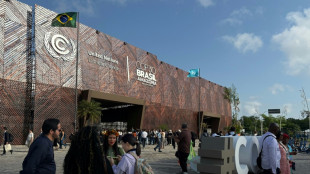 Climate talks run into night as COP30 hosts seek breakthrough
Climate talks run into night as COP30 hosts seek breakthrough
-
Germany and Netherlands lock up World Cup spots in style

-
 Germany's Woltemade hopes for 2026 World Cup spot after scoring again
Germany's Woltemade hopes for 2026 World Cup spot after scoring again
-
Germany 'send message' with Slovakia rout to reach 2026 World Cup

-
 Trump unveils fast-track visas for World Cup ticket holders
Trump unveils fast-track visas for World Cup ticket holders
-
Netherlands qualify for World Cup, Poland in play-offs

-
 Germany crush Slovakia to qualify for 2026 World Cup
Germany crush Slovakia to qualify for 2026 World Cup
-
Stocks gloomy on earnings and tech jitters, US rate worries

-
 'In it to win it': Australia doubles down on climate hosting bid
'In it to win it': Australia doubles down on climate hosting bid
-
Former NFL star Brown could face 30 yrs jail for shooting case: prosecutor

-
 Fate of Canada government hinges on tight budget vote
Fate of Canada government hinges on tight budget vote
-
New research measures how much plastic is lethal for marine life

-
 Mbappe, PSG face off in multi-million lawsuit
Mbappe, PSG face off in multi-million lawsuit
-
EU defends carbon tax as ministers take over COP30 negotiations

-
 McCartney to release silent AI protest song
McCartney to release silent AI protest song
-
Stocks tepid on uncertainty over earnings, tech rally, US rates

-
 Louvre shuts gallery over ceiling safety fears
Louvre shuts gallery over ceiling safety fears
-
'Stranded, stressed' giraffes in Kenya relocated as habitats encroached

-
 US Supreme Court to hear migrant asylum claim case
US Supreme Court to hear migrant asylum claim case
-
Western aid cuts could cause 22.6 million deaths, researchers say

-
 Clarke hails Scotland 'legends' ahead of crunch World Cup qualifier
Clarke hails Scotland 'legends' ahead of crunch World Cup qualifier
-
S.Africa says 'suspicious' flights from Israel show 'agenda to cleanse Palestinians'

-
 South Korea pledges to phase out coal plants at COP30
South Korea pledges to phase out coal plants at COP30
-
Ex-PSG footballer Hamraoui claims 3.5m euros damages against club

-
 Mbappe, PSG in counterclaims worth hundreds of millions
Mbappe, PSG in counterclaims worth hundreds of millions
-
Two newly discovered Bach organ works unveiled in Germany

-
 Stocks lower on uncertainty over earnings, tech rally, US rates
Stocks lower on uncertainty over earnings, tech rally, US rates
-
Barca to make long-awaited Camp Nou return on November 22

-
 COP30 talks enter homestretch with UN warning against 'stonewalling'
COP30 talks enter homestretch with UN warning against 'stonewalling'
-
France makes 'historic' accord to sell Ukraine 100 warplanes

-
 Delhi car bombing accused appears in Indian court, another suspect held
Delhi car bombing accused appears in Indian court, another suspect held
-
Emirates orders 65 more Boeing 777X planes despite delays

-
 Ex-champion Joshua to fight YouTube star Jake Paul
Ex-champion Joshua to fight YouTube star Jake Paul
-
Bangladesh court sentences ex-PM to be hanged for crimes against humanity

-
 Trade tensions force EU to cut 2026 eurozone growth forecast
Trade tensions force EU to cut 2026 eurozone growth forecast
-
'Killed without knowing why': Sudanese exiles relive Darfur's past

-
 Stocks lower on uncertainty over tech rally, US rates
Stocks lower on uncertainty over tech rally, US rates
-
Death toll from Indonesia landslides rises to 18

-
 Macron, Zelensky sign accord for Ukraine to buy French fighter jets
Macron, Zelensky sign accord for Ukraine to buy French fighter jets
-
India Delhi car bomb accused appears in court


Bolivian toymaker restores limbs, dignity with 3D-printing
As a kid growing up in poverty in rural Bolivia, Roly Mamani built his own toys. Now a 34-year-old engineer, he 3D prints limbs for Indigenous compatriots scarred by life-changing accidents.
Mamani funds the endeavor with the money he makes from selling robotic toys he makes -- his other passion, which, after building his first remote-controlled toy car as a child, he never abandoned.
Surrounded by prostheses, plants and 3D-printed dinosaurs in his study, Mamani pores over an arm he is devising for a boy who lost his due to an electric surge.
It is his purpose, the engineer told AFP, "to improve people's quality of life."
The son of small-scale farmers, Mamani grew up in Achocalla, a community nestled between two lagoons some 15 kilometers (10 miles) north of the capital La Paz, verdant with pasture, vegetables and tubers.
With no money for toys, he started building his own play cars from plastic and cardboard at a young age, upgrading in primary school to a motorized version.
Before entering public university, Mamani worked for two years at an automobile workshop where he was exposed to "the first real machines I ever saw."
Ten years ago, he opened his own workshop in Achocalla to build robotic toys and educational aids.
"You could say I have all the toys I want now," he said.
Then everything changed when he heard about a rural man without hands and thought to himself: "I can make them for him."
In 2018, the toymaker of Achocalla set out to find life-improving solutions for other disfigured Bolivians with his 3D printers.
"Science is like a superpower. Robotics is a trend, but if it does not address important things, it doesn't mean anything," he mused.
- More than 400 made -
Against the background noise of printers at work, Mamani told AFP he can create six units a month.
Since 2018, "we have made more than 400 prostheses," he said.
Half were delivered free of charge or at the cost of production, funded by his robotics sales.
On average, a 3D-printed prosthesis in Bolivia costs about $1,500, more than five times the minimum salary.
A functional prosthesis -- the type that allows certain movements -- can cost as much as $30,000.
Yet the public health system does not cover prosthetics, in a country where some 36,100 people have physical and mobility problems, according to the state-aligned National Committee of People with Disabilities.
Mamani himself chooses the recipients of his donations from the countless requests he receives, including from abroad.
"The people in the most need are those who work precarious jobs without safety, which is why they have these accidents in which they lose a limb," he said.
- 'A blessing' -
One of their beneficiaries is 59-year-old Pablo Matha, who lost his vision and right hand seven years ago in a mining accident involving dynamite.
After that, "I went out every day to ask for some coins (on the street.) That's where my friend Roly and his brother found me," Matha told AFP.
Mamani's brother Juan Carlos is a physiotherapist, who helps with the patients' physical rehabilitation.
Matha said the prosthesis helped him regain his self-respect. He now plays the guitar to earn a living.
He said he used to "feel people looking at me and laughing. But now that I have the prosthesis... sometimes I feel that I am like any ordinary person."
Marco Antonio Nina, 26, was another recipient. As a teenager, working on a masonry project, an electric shock severed his left arm and stunted the right one.
"I like to sing, but without the prosthesis it hurt to hold the microphone... Now with this, it's a blessing," he said.
Mamani wants to use the recognition he has won for his work -- he has been awarded a US robotics scholarship -- to set up a rehabilitation center.
"I want to generate my own technology, I have to improve," he said.
Q.Bulbul--SF-PST




